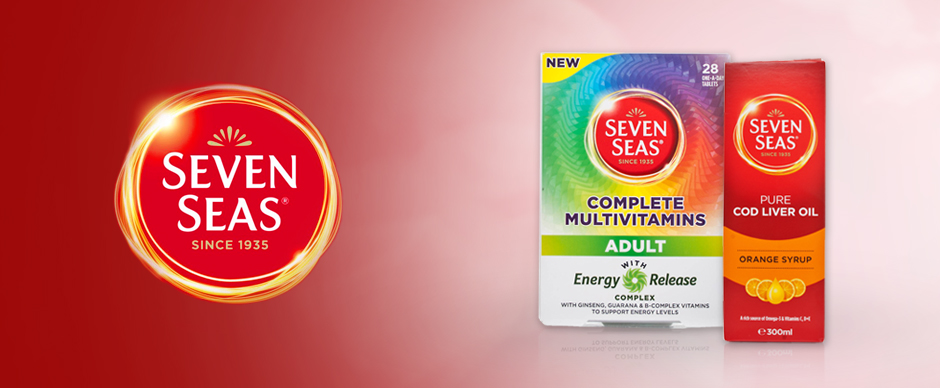
Vitamins, Minerals and Supplements
Seven Seas provide you with a variety of supplemental vitamins and minerals that are essential to the body for overall health. Vitamins and minerals are important because they protect the body from oxidative damage and gene expression and are essential for the maintenance of healthy cells, tissues, and organisms in the body. A healthy, well-rounded diet that contains low-fat protein and dairy, fresh vegetables and fruit, and whole grains is a good source of natural vitamins and minerals; however, taking supplements can help to fill in any nutritional gaps that you might have.
Although the body needs small amounts of vitamins to aid in its daily functions, growth, and repair, vitamins are not made in the body and must be obtained from food or supplement sources. A diet that lacks the necessary vitamins and minerals can increase the risk of sickness and disease. In fact, most discoveries about vitamins throughout history came as a direct result to learning about the results of their deficiency. For example, the importance of vitamin C was discovered after sailors in the 18th century suffered from scurvy while at sea and were treated with citrus juice.
Fat-soluble vitamins
Vitamins fit into two categories: fat-soluble vitamins and water-soluble vitamins. Fat-soluble vitamins are not able to dissolve in water and need fat to be absorbed properly. These vitamins act like hormones in the body and relay messages within it. Because they cannot dissolve in water, these vitamins are transported through the blood with fat or other proteins. The fat-soluble vitamins the body needs are:
- Vitamin A
- Vitamin D
- Vitamin E
- Vitamin K
These vitamins are found in meat, fish, animal fat, vegetable oils, green vegetables, dairy products, nuts, and seeds. They are transported around the body in fat and are stored in the liver and in fatty tissues.
Water-soluble vitamins
Water-soluble vitamins can dissolve in water and are excreted through urine. These vitamins encourage the healthy metabolization of carbohydrates, proteins, and fats. Water-soluble vitamins are different from fat-soluble vitamins because they can be directly absorbed into the intestine and released into the bloodstream. Water-soluble vitamins include:
- Vitamins B2, B3, B6, and B12
- Folate
- Thiamine
- Pantothenic acid
- Vitamin C
- Biotin
- Choline
Unlike fat-soluble vitamins, the body does not store these vitamins in the liver or fatty tissue: hence, water-soluble vitamins should be taken each day in food or supplement form. Supplements or foods like meat, fish, fruit, vegetables and whole grains can help to provide the body with these essential vitamins.
Minerals
Minerals help turn food into energy and help strengthen your overall health. Essential minerals for your health include:
- Calcium
- Iron
- Magnesium
- Phosphorous
- Potassium
- Zinc
- Sodium
- Sulphur
- Chromium
- Copper
- Iodine
- Manganese
- Molybdenum
- Selenium



